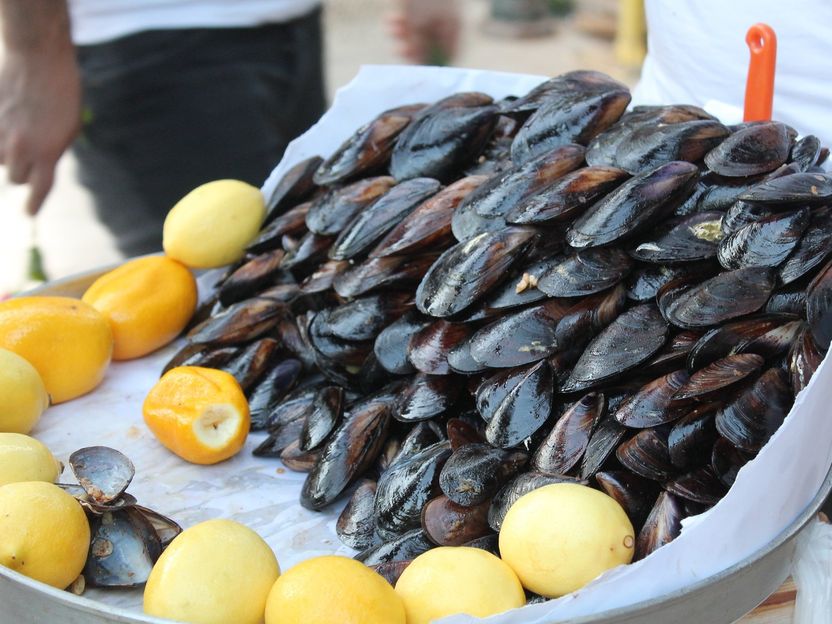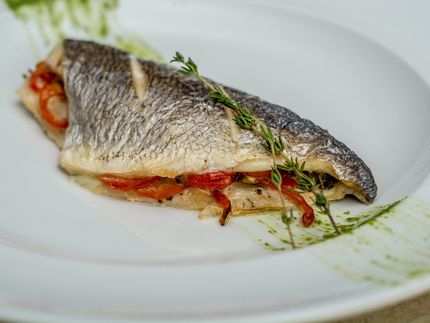If you eat mussels, you eat microplastics
Bayreuth study: the most consumed species of mussels contain microplastics all around the world
"If you eat mussels, you eat microplastics." This was already known to a limited extent about mussels from individual ocean regions. A new study by the University of Bayreuth, led by Prof. Dr. Christian Laforsch, reveals that this claim holds true globally. The Bayreuth team investigated the microplastic load of four mussel species which are particularly often sold as food in supermarkets from twelve countries around the world. The scientists now present their research results in the journal "Environmental Pollution".

Bild von Zumasik auf Pixabay
All the samples analyzed contained microplastic particles, and the researchers detected a total of nine different types of plastic. Polypropylene (PP) and polyethylene terephthalate (PET) were the most common types of plastic. Both are plastics ubiquitous to people's everyday lives all over the world. To make the analyses of different sized mussels comparable, one gram of mussel meat was used as a fixed reference. According to the study, one gram of mussel meat contained between 0.13 and 2.45 microplastic particles. Mussel samples from the North Atlantic and South Pacific were the most contaminated. Because mussels filter out microplastic particles from the water in addition to food particles, a microplastic investigation of the mussels allows indirect conclusions to be drawn about pollution in their respective areas of origin.
The four species of mussels sampled were the European blue mussel, the greenshell mussel, the undulate venus, and the Pacific venus clam. All of the mussels sampled were purchased from grocery stores. Some of them had been farmed while some were wild catch from the North Sea, the Mediterranean Sea, the Atlantic Ocean, the South Pacific Ocean, the South China Sea, and the Gulf of Thailand.
The microplastic particles detected in the mussels were of a size of between three and 5,000 micrometres, i.e. between 0.003 and five millimetres. Special enzymatic purification was followed by chemical analysis of the particles via micro-Fourier transform infrared spectrometry (micro-FTIR) and Raman spectroscopy. "To analyze the types of microplastic, we used so-called random forest algorithms for the first time in this study, both for the immensely large micro-FTIR data sets and for the Raman measurement data. These enabled us to evaluate data quickly, automatically, and reliably," says Dr. Martin Löder, head of the plastics working group at the chair of Prof. Dr. Christian Laforsch.
Indeed, the contamination of different organisms with microplastics has been investigated in earlier research. However, the results available to date can only be compared with each other to a very limited extent because often different analytical methods were used in the studies. "Our new study represents an important advance in terms of methodology. We have combined the latest technologies and procedures in sample preparation, measurement, and analysis of microplastic contamination in such a way that comparable results can be obtained on this basis in the future. Such methodological harmonization is an indispensable prerequisite for correctly assessing and evaluating risks potentially emanating from the spread of microplastics in the environment," says Prof. Dr. Christian Laforsch, spokesperson for the "Microplastics" Collaborative Research Centre at the University of Bayreuth, and Chair of Animal Ecology I.
Original publication
Most read news
Other news from the department science

Get the food & beverage industry in your inbox
By submitting this form you agree that LUMITOS AG will send you the newsletter(s) selected above by email. Your data will not be passed on to third parties. Your data will be stored and processed in accordance with our data protection regulations. LUMITOS may contact you by email for the purpose of advertising or market and opinion surveys. You can revoke your consent at any time without giving reasons to LUMITOS AG, Ernst-Augustin-Str. 2, 12489 Berlin, Germany or by e-mail at revoke@lumitos.com with effect for the future. In addition, each email contains a link to unsubscribe from the corresponding newsletter.



























































